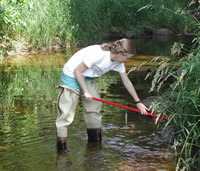Why Research?
There are lots of myths about faculty-student research, scholarship and creativity as well as many good reasons why students should get involved.
-
Myth
I don’t know have a research, scholarship or creativity project, so can't get involved.
Reality
Many faculty are excited to engage students in research. All you need to do is make an appointment to talk to them about the possibilities. The professor will share with you some ideas of projects you could do and describe the nature of that work. Every professor is different in how they work with students, so ask them! Also “shop around”; talk with a couple of professors before you decide. Be aware that some profs may have a full group and may not be taking new students, or may conduct research that doesn't lend itself to student involvement.
MythResearch, Scholarship or Creative Projects are done in the library.
Reality
These projects take place in a wide range of places: in the laboratory, outdoors, in a dance or art studio, or in the library. You will be introduced to a new "home base" where you can do your project, learn from fellow students, and hangout and get to know your professor!
Myth
Listing “research” on my resume will make me more employable.
Reality
Having a faculty/student project on your resume might enhance your opportunities after you graduate. However if this is the only reason you are seeking research, you should rethink your motives. Most professors are looking for students interested in learning and not just resume
building.
MythFaculty/student projects are too hard and my grades aren’t good enough.
Reality
The most important attributes for faculty/student research are self-motivation and interest. What you learn usually involves concepts outside of textbook memorization, so a C+ students may still be a quick learner in the studio or laboratory. The opposite can be true, however: the A+ memorizer is not guaranteed an easy time being involved in a faculty/student project!
MythI don’t have time to become involved in a research project.
Reality
The time needed for faculty-student research, scholarship, and creativity varies considerably depending on the kind of project you work on. Some projects require specific time commitments whereas others are can be done on your own schedule. It is important, however, to be clear about the time commitment going into a project. Signing up for research and then showing a weak effort is worse than not signing up for research.
MythI can do research, music, 5 different clubs, 3 service activities, sports and carry 5 credits.
Reality
As outlined above, being engaged in a faculty/student project takes time and a serious commitment. Don’t seek research opportunities unless you are willing to make it a priority and adjust other activities accordingly.
Myth
This isn't worth my time if I don’t get academic credit on my transcript.
Reality
You might learn more by being engaged in faculty-student research than you will in a classroom setting. You will likely learn many new techniques, how to think critically and solve problems, and how to present the results in writing and orally.
MythProfessors are scary and hard to approach.
Reality
Professors love to work with students. Working on a collaborative research project is a great way to get to know a professor. The professor you choose to do research with is someone who can provide career advice and a really strong letter of recommendation. (A letter of recommendation from a professor for a research experience allows the prof to address many issues not covered in a class setting and can be an asset to the student.)
MythI will have to give scary presentations on my research.
Reality
Part of doing research is communicating results. This means that when you have results you
will want to present them. This may take a semester or a couple of years depending on your project. Your research professor will help you learn how to present your results so it isn’t scary. After all, you will become the expert on your research topic and know more about it than anyone else!
Information on this page is based on suggestions from Dr. Cindy Johnson.
